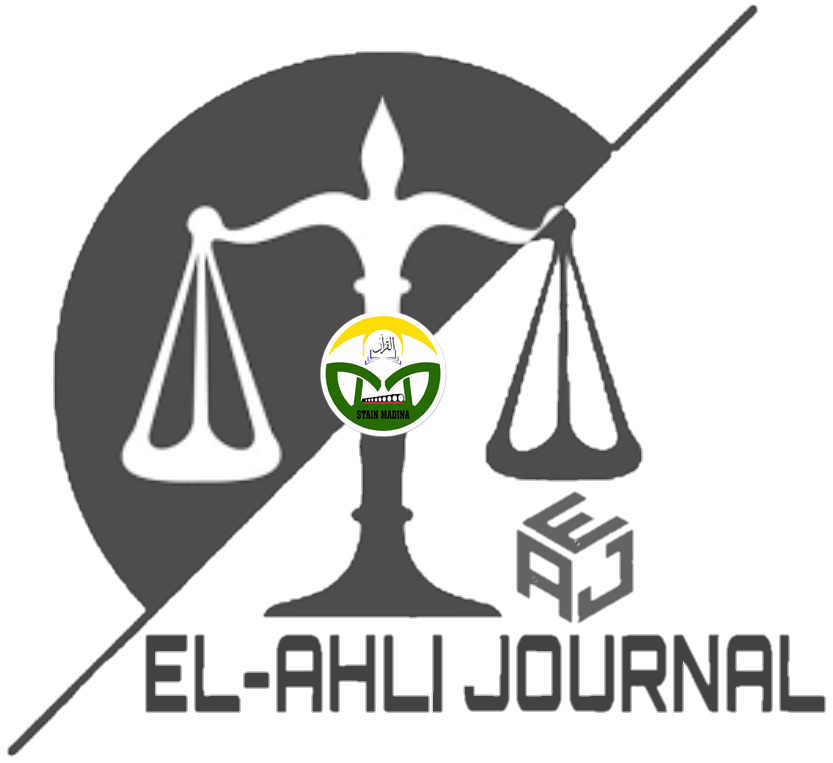PENERAPAN KEWARISAN ISLAM DALAM SEJARAH, HUKUM DAN ASAS-ASASNYA
DOI:
https://doi.org/10.56874/el-ahli.v3i2.998Kata Kunci:
Kewarisan Islam, asas, rukun, syarat, sebabAbstrak
This study discusses Islamic inheritance and matters related to its application. In Islamic teachings, the issue of inheritance occupies a very important role. In some Muslim societies conflicts often arise between fellow heirs regarding the distribution of inheritance. Therefore it is very necessary for the Muslim community to know the problem of inheritance in Islam. Research is a literature study. In collecting data, the authors conducted a search of a number of books, books and articles and other scientific works. The results of the study explain that Islamic inheritance begins with a long history in practice starting from pre-Islam and the revelation of the Qur'an. In the application of Islamic inheritance, it must be known starting from the law, propositions, principles and other related matters such as pillars, conditions, causes, and barriers.
Abstrak
Penelitian ini membahas tentang kewarisan Islam serta hal-hal yang terkait dengan penerapannya. Dalam ajaran Islam masalah kewarisan menduduki peran yang sangat penting. Pada sebagian masyarakat muslim sering muncul konflik antar sesama ahli waris terkait pembagian warisan. Oleh karena itu sangat perlu bagi masyarakat muslim mengetahui masalah kewarisan dalam Islam. Penelitian merupakan studi pustaka. Dalam mengumpulkan data-data, maka penulis melakukan penelusuran sejumlah kitab, buku dan artikel serta karya ilmiah lainnya. Hasil penelitian menjelaskan bahwa kewarisan Islam diawali dengan sejarah panjang dalam praktiknya mulai dari pra-Islam dan turunnya Alqu’ran. Dalam penerapan kewarisan Islam harus diketahui mulai dari hukum, dalil, asas serta hal terkait lainnya seperti rukun, syarat, sebab, dan penghalang.
Kata Kuci: Kewarisan Islam, Asas, Rukun, Syarat, Sebab
Referensi
An-Naisaburi, Al-Imam Abul Husain Muslim bin al-Hajjaj al-Qusyairi, Shohih Muslim (Kerajaan Arab Saudi: Darussalam, 2000)
Ar-Rozi, Syekh Imam Muhammad ibn Abu Bakar ibn Abdul Qodir, Mukhtarus Shohhah (Kairo: Dar El Hadith, 2003)
Basri, Saifullah, ‘Hukum Waris Islam ( Fara ’ Id ) Dan Penerapannya Dalam Masyarakat Islam’, Jurnal Kepastian Hukum Dan Keadilan, 1.2 (2020), 37–46
Fauzi, Mohammad, ‘Legislasi Hukum Kewarisan Di Indonesia’, Jurnal Pengembangan Masyarakat Islam, 9.2 (2016), 53–76
Husien, Syarief, and Akhmad Khisni, ‘Hukum Waris Islam Di Indonesia (Studi Perkembangan Hukum Kewarisan Dalam Kompilasi Hukum Islam Dan Praktek Di Pengadilan Agama )’, Jurnal Akta, 5.1 (2018), 75–86 <https://doi.org/10.30659/akta.v5i1.2533>
Indonesia, Kementerian Agama Republik, Al- Qur’ân Al- Karîm Dan Terjemahannya (Surabaya: Halim, 2014)
Khalifah, Muhammad Taha Abu Al ’Ala, Ahkam Al Mawarits Dirasah Tathbiqiyah (Kairo: Dar Al Salam, 2005)
Naskur, ‘ASAS-ASAS HUKUM KEWARISAN DALAM ISLAM (Studi Analisis Pendekatan Al-Qur’an Dan Al-Hadis Sebagai Sumber Hukum Islam) Naskur’, 2005
Qonun, Lajnah Qism Al Fiqh Fak. Syariah wal, Fiqh Al Mawarits (Kairo: Universitas Al Azhar, 2010)
Raja Ritonga, Andri Muda, Jannus Tambunan, Akhyar, ‘Dinamika Maslahat Dalam Kewarisan Islam’, Sang Pencerah Jurnal Ilmiah Universitas Muhammadiyah Buton, 8.1 (2022), 119–27
Raja Ritonga, Martua Nasution, ‘Teori Penentuan Bagian Ahli Waris Ashabul Furudh’, Teraju: Jurnal Syariah Dan Hukum, 4.01 (2022), 15–25
Ritonga, Raja, ‘Sistem Kewarisan Adat Masyarakat Muslim Suku Tengger Perspektif Hukum Islam’, El Ahli: Jurnal Hukum Keluarga Islam, 1.1 (2020), 1–19
———, ‘Ta’yin; Penentuan Bagian Ahli Waris Sebelum Pembagian Warisan’, Al-Syakhshiyyah, 3.1 (2021), 29–47 <https://doi.org/10.35673/as-hki.v3i1.1348>
———, ‘Teori Dan Praktik Penentuan Ahli Waris Ashobah Dalam Konsep Syajarotul Mirats’, Nizham, 10.1 (2022), 42–57 <https://doi.org/10.32332/nizham.v10i1.4804>
———, ‘The Firts Class of Women Heir Member in The Observation of Surah An-Nisa Ayat 11, 12 and 176’, Al- ‘ A Dalah?: Jurnal Syariah Dan Hukum Islam, 6.1 (2021), 1–17 <https://doi.org/10.31538/adlh.v6i1.1362>
Ritonga, Raja, and Amhar Maulana Harahap, ‘Dinamisasi Kewarisan Islam Pada Kasus Musytarikah Dalam Konsep Syajarotul Mirats’, Al-Ahwal Al-Syakhsiyyah: Jurnal Hukum Keluarga Dan Peradilan Islam, 3.1 (2022), 1–17 <https://doi.org/10.15575/as.v3i1.17248>
Shobuni, Syekh Muhammad Ali, Al Mawarits Fi Asy-Syari’ah Al- Islamiyah Fi Dhoui Al Kitab Wa As Sunnah (Kairo: Daar Ash Shobuni, 2002)
Wahyuni, Afidah, ‘Sistem Waris Dalam Perspektif Islam Dan Peraturan Perundang-Undangan Di Indonesia’, SALAM: Jurnal Sosial Dan Budaya Syar-I, 5.2 (2018), 147–60 <https://doi.org/10.15408/sjsbs.v5i2.9412>
Washil, Naser Farid Muhammad, Fiqhu Al Mawarits Wa Al Wasiyah (Kairo: Dar Al Salam, 1995)
Yuliandari, Ida Ayu Adi Iin, I Ketut Sukadana, and Diah Gayatri Sudibya, ‘Kedudukan Cucu Sebagai Ahli Waris Pengganti Dalam Hukum Waris Islam (Studi Kasus Nomor: 0013/PDT.P/2015/PA.DPS)’, Jurnal Analogi Hukum, 2.3 (2020), 346–50 <https://doi.org/10.22225/ah.2.3.2520.346-350>
Unduhan
Diterbitkan
Cara Mengutip
Terbitan
Bagian
Lisensi
All articles published in EL-AHLI: Jurnal Hukum Keluarga Islam are licensed under a Creative Commons Attribution-ShareAlike 4.0 International License (CC BY-SA 4.0).
Under this license, authors and readers are free to:
-
Share — copy and redistribute the material in any medium or format.
-
Adapt — remix, transform, and build upon the material for any purpose, even commercially.
Under the following terms:
-
Attribution — You must give appropriate credit, provide a link to the license, and indicate if changes were made. You may do so in any reasonable manner but not in any way that suggests the licensor endorses you or your use.
-
ShareAlike — If you remix, transform, or build upon the material, you must distribute your contributions under the same license as the original.
Copyright and Licensing Policy:
-
The author retains copyright and grants the journal the right of first publication with the work simultaneously licensed under the Creative Commons Attribution-ShareAlike 4.0 International License, which allows others to share the work with acknowledgment of the work’s authorship and initial publication in this journal.
-
Authors are allowed to enter into separate, additional contractual arrangements for the non-exclusive distribution of the journal's published version of the work (e.g., post it to an institutional repository or publish it in a book), with an acknowledgment of its initial publication in this journal.
Link to License:
https://creativecommons.org/licenses/by-sa/4.0/





